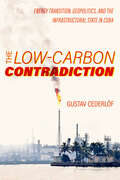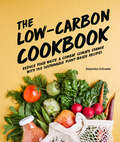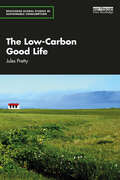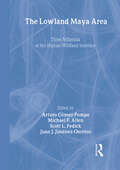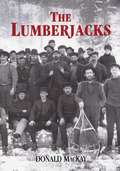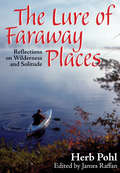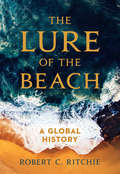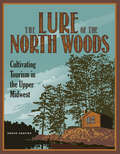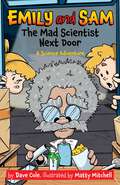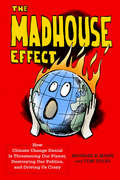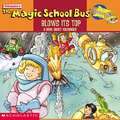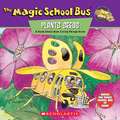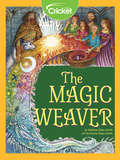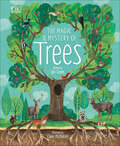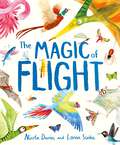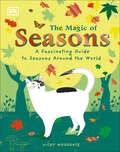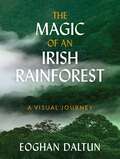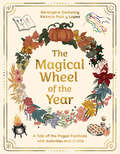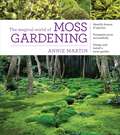- Table View
- List View
The Low-Carbon Contradiction: Energy Transition, Geopolitics, and the Infrastructural State in Cuba (Critical Environments: Nature, Science, and Politics #13)
by Gustav CederlofIn the pursuit of socialism, Cuba became Latin America’s most oil-dependent economy. When the Soviet Union collapsed, the country lost 86 percent of its crude oil supplies, resulting in a severe energy crisis. In the face of this shock, Cuba started to develop a low-carbon economy based on economic and social reform rather than high-tech innovation. The Low-Carbon Contradiction examines this period of rapid low-carbon energy transition, which many have described as a "Cuban miracle" or even a real-life case of successful "degrowth." Working with original research from inside households, workplaces, universities, and government offices, Gustav Cederlöf retells the history of the Cuban Revolution as one of profound environmental and infrastructural change. In doing so, he opens up new questions about energy transitions, their politics, and the conditions of a socially just low-carbon future. The Cuban experience shows how a society can transform itself while rapidly cutting carbon emissions in the search for sustainability.
The Low-Carbon Cookbook & Action Plan: Reduce Food Waste and Combat Climate Change with 140 Sustainable Plant-Based
by Alejandra SchraderWINNER IN THE FOOD WASTE CATEGORY OF THE GOURMAND WORLD COOKBOOK AWARDS FOR THE UNITED STATESDiscover how to reduce the carbon footprint sitting on your dinner plateFrom the farmers to the delivery trucks and everything in between, there are countless people and processes involved in getting meat and produce from where they're made to your kitchen. This recipe book highlights the difficulties and pleasures of eating sustainably!If you're looking for a way to combat climate change from your kitchen, this cookbook will help you with your goals. It includes: • An introduction to the climate crisis and what the low-carbon diet is • Expert tips and advice on how to eat a low-carbon diet • Science-backed information on how to shop and cook smart by making the most-climate friendly choices • 140 plant-based recipes made with fresh, wholesome, and seasonal ingredients that can help you lower your carbon footprint and foodprint You may not think your food has anything to do with global warming, but in reality, the food industry has an undeniable impact on the environment and contributes one-fourth of our global greenhouse gas emissions. You can take a few small steps to help lower that number by introducing a low-carbon diet into your kitchen and life - and The Low-Carbon Cookbook will show you exactly how. Determining a food&’s carbon cost can be difficult. From examining the impact of the supply chain for foods to evaluating the carbon footprint of various plant-based options, this cookbook shows you exactly how to make the most environmentally friendly food choices. Packed with over 140 delicious recipes made with sustainable ingredients, this climate-friendly cooking book will teach you how to calculate your footprint, reduce your meat and dairy intake, and eat seasonal and local. • • • &“The Low-Carbon Cookbook is a welcome roadmap for home chefs of any level who care about the future of our planet and making conscious food choices. Alejandra Schrader blends detailed research with vibrant, delicious recipes that make eating a climate-friendly diet possible. With this delightful thought-provoking book, everyone can start making changes in how they eat today that will have a big impact on our planet tomorrow. In these times of climate crisis, this is a must-read for all who care about food, our climate, and all the living beings who share our planet.&” – Abby Maxman, president and CEO of Oxfam America &“When Alejandra writes about the relationship between the food we eat and the impact it has on the environment, she&’s not just doing it on a hunch—she&’s done the research and shares it in a way that&’s not polarizing or politicizing. By setting the table with food and facts, Alejandra provides anyone who cares about the food they eat with plenty of inspiration for creating meals that taste—and do—good.&” – Courtney Hazlett, executive producer and creator, Netflix&’s Restaurants on the Edge &“Our planet is in a crisis. Food systems are in a crisis. Rates of malnutrition—stunting and starvation and obesity—are on the increase. Many countries around the world have adopted farming and production patterns that are designed for convenient consumption and mass calories rather than the sustainability of the planet and good health. With more than 30,000 edible plants available on Earth, it&’s criminal we have come to rely on 3 crops for more than 60% of our calories. It&’s crucial we understand the relationship between nutrition and the health of our bodies—as well as planetary health—in order to care for our planet and to change food systems for the better. However, we can&’t talk about planetary health,
The Low-Carbon Good Life (Routledge-SCORAI Studies in Sustainable Consumption)
by Jules PrettyThe Low-Carbon Good Life is about how to reverse and repair four interlocking crises arising from modern material consumption: the climate crisis, growing inequality, biodiversity loss and food-related ill-health. Across the world today and throughout history, good lives are characterised by healthy food, connections to nature, being active, togetherness, personal growth, a spiritual framework and sustainable consumption. A low-carbon good life offers opportunities to live in ways that will bring greater happiness and contentment. Slower ways of living await. A global target of no more than one tonne of carbon per person would allow the poorest to consume more and everyone to find our models of low-carbon good lives. But dropping old habits is hard, and large-scale impacts will need fresh forms of public engagement and citizen action. Local to national governments need to act; equally, they need pushing by the power and collective action of citizens. Innovative and engaging and written in a style that combines storytelling with scientific evidence, this book will be of great interest to students and scholars of climate change, sustainability, environmental economics and sustainable consumption, as well as non-specialist readers concerned about the climate crisis.
The Lowland Maya Area: Three Millennia at the Human-Wildland Interface
by Arturo Gómez-Pompa Michael F. Allen Scott L. Fedick Juan J. Jiménez-OsornioWhat can we learn from the people of the Maya Lowlands? Integrating history, biodiversity, ethnobotany, geology, ecology, archaeology, anthropology, and other disciplines, The Lowland Maya Area is a valuable guide to the fascinating relationship between man and his environment in the Yucatán peninsula. This book covers virtually every aspect of the biology and ecology of the Maya Lowlands and the many ways that human beings have interacted with their surroundings in that area for the last three thousand years. You'll learn about newly discovered archaeological evidence of wetland use; the domestication and use of cacao and henequen plants; a biodiversity assessment of a select group of plants, animals, and microorganisms; the area's forgotten cotton, indigo, and wax industries; the ecological history of the Yucatán Peninsula; and much more. This comprehensive book will open your eyes to all that we can learn from the Maya people, who continue to live on their native lands, integrating modern life with their old ways and teaching valuable lessons about human dependence on and management of environmental resources. The Lowland Maya Area explores: the impact of hurricanes and fire on local environments historic and modern Maya concepts of forests the geologic history of the Yucatán challenges to preserving Maya architecture newly-discovered evidence of fertilizer use among the ancient Maya cooperation between locals and researchers that fosters greater knowledge on both sides recommendations to help safeguard the future The Lowland Maya Area is an ideal single source for reliable information on the many ecological and social issues of this dynamic area. Providing you with the results of the most recent research into many diverse fields, including traditional ecological knowledge, the difficult transition to capitalism, agave production, and the diversity of insect species, this book will be a valuable addition to your collection. As the editors of The Lowland Maya Area say in their concluding chapter: If we are to gain global perspective from the changing Maya world, it is that understanding space and time is absolutely critical to human persistence. Understanding how the Maya have interacted with their environment for thousands of years while maintaining biodiversity will help us understand how we too can work for sustainable development in our own environments.
The Lumberjacks
by Donald MackayShort-listed for the 1978 Governor General’s Award for Non-Fiction The 19th century spawned a unique breed of men who took pride in their woodsmen skills and rough codes of conduct. They called themselves lumberers, shantymen, timber beasts, les bucherons – and, more recently, lumberjacks, working in the vast forests of eastern Canada and British Columbia. Across the country, farm boys would go to the woods, lumbering being the only winter work available. Immigrants – Swedes and Finns more often than not – resumed the trades they had learned so well in the forests of northern Europe. They broke the cold, hard monotony of camp life with songs, tall tales and card games. Within these pages, author Donald MacKay allows us a glimpse into that moment in our heritage when men entered the virgin forest to carve out an industry from the seemingly endless array of pine, spruce, maple and balsam fir found there.
The Lure of Faraway Places
by James Raffan Herb PohlThe Lure of Faraway Places is the publication canoeist Herb Pohl (1930-2006) did not live to see published. But Pohl's words and images provide a unique portrait of Canada by one who was happiest when travelling our northern waterways alone. Austrian-born Herb Pohl died at the mouth of the Michipcoten River on July 17, 2006. He is remembered as "Canada's most remarkable solo traveller." While mourning their loss, Herb Pohl's friends found, to their surprise and delight, a manuscript of wilderness writings on his desk in his lakeside apartment in Burlington, Ontario. He had hoped one day to publish his work as a book. With help and commentary from best-selling canoe author and editor James Raffan, Natural Heritage is proud to present that book, Herb's book, The Lure of Faraway Places. "There's nothing like it in canoeing literature," says Raffan. "It's part journal, part memoir, part wilderness philosophy and part tips and tricks of the most pragmatic kind written about parts of the country most of us will never see by the most committed and ambitious solo canoeist in Canadian history."
The Lure of the Beach: A Global History
by Robert C. RitchieA human and global take on a beloved vacation spot. The crash of surf, smell of salted air, wet whorls of sand underfoot. These are the sensations of the beach, that environment that has drawn humans to its life-sustaining shores for millennia. And while the gull’s cry and the cove’s splendor have remained constant throughout time, our relationship with the beach has been as fluid as the runnels left behind by the tide’s turning.The Lure of the Beach is a chronicle of humanity's history with the coast, taking us from the seaside pleasure palaces of Roman elites and the aquatic rituals of medieval pilgrims, to the venues of modern resort towns and beyond. Robert C. Ritchie traces the contours of the material and social economies of the beach throughout time, covering changes in the social status of beach goers, the technology of transport, and the development of fashion (from nudity to Victorianism and back again), as well as the geographic spread of modern beach-going from England to France, across the Mediterranean, and from nineteenth-century America to the world. And as climate change and rising sea levels erode the familiar faces of our coasts, we are poised for a contemporary reckoning with our relationship—and responsibilities—to our beaches and their ecosystems. The Lure of the Beach demonstrates that whether as a commodified pastoral destination, a site of ecological resplendency, or a flashpoint between private ownership and public access, the history of the beach is a human one that deserves to be told now more than ever before.
The Lure of the North Woods: Cultivating Tourism in the Upper Midwest
by Aaron ShapiroIn the late nineteenth century, the North Woods offered people little in the way of a pleasant escape. Rather, it was a hub of production supplying industrial America with vast quantities of lumber and mineral ore. This book tells the story of how northern Minnesota, northern Wisconsin, and Michigan&’s Upper Peninsula became a tourist paradise, turning a scarred countryside into the playground we know today.Stripped of much of its timber and ore by the early 1900s, the North Woods experienced deindustrialization earlier than the Rust Belt cities that consumed its resources. In The Lure of the North Woods, Aaron Shapiro describes how residents and visitors reshaped the region from a landscape of exploitation to a vacationland. The rejuvenating North Woods profited in new ways by drawing on emerging connections between the urban and the rural, including improved transportation, promotion, recreational land use, and conservation initiatives. Shapiro demonstrates how this transformation helps explain the interwar origins of modern American environmentalism, when both the consumption of nature for pleasure and the work of the Civilian Conservation Corps in the North Woods and elsewhere led many Americans to cultivate a fresh perspective on the outdoors. At a time when travel and recreation are considered major economic forces, The Lure of the North Woods reveals how leisure—and tourism in particular—has shaped modern America.
The Lying StonesThe lying stones of Marrakech: Penultimate Reflections in Natural History
by Stephen Jay GouldEssays culled from Gould's monthly column "The View of Life", in Natural History magazine that he wrote for 27 years.
The Mad Scientist Next Door (Emily and Sam)
by David ColeA new mystery unfolds when Emily and Sam get a new neighbor!Emily and Sam are excited to see a moving van next door, but the new neighbor isn't quite what they were hoping for. He doesn't have any kids, seems grumpy, wears a weird white lab coat, and he keeps getting heavy boxes delivered to his garage. Could he really be a mad scientist? And could he have something to do with their friend's missing dogs? The siblings can't accuse him of anything without evidence, so they set out to use the scientific method to prove he's up to something.The second chapter book in the Emily and Sam series offers opportunities to investigate alongside the siblings to solve the case of the mad scientist next door!
The Madhouse Effect: How Climate Change Denial Is Threatening Our Planet, Destroying Our Politics, and Driving Us Crazy
by Michael Mann Tom TolesThe award-winning climate scientist Michael E. Mann and the Pulitzer Prize–winning political cartoonist Tom Toles have been on the front lines of the fight against climate denialism for most of their careers. They have witnessed the manipulation of the media by business and political interests and the unconscionable play to partisanship on issues that affect the well-being of billions. The lessons they have learned have been invaluable, inspiring this brilliant, colorful escape hatch from the madhouse of the climate wars. The Madhouse Effect portrays the intellectual pretzels into which denialists must twist logic to explain away the clear evidence that human activity has changed Earth's climate. Toles's cartoons collapse counter-scientific strategies into their biased components, helping readers see how to best strike at these fallacies. Mann's expert skills at science communication aim to restore sanity to a debate that continues to rage against widely acknowledged scientific consensus. The synergy of these two climate science crusaders enlivens the gloom and doom of so many climate-themed books—and may even convert die-hard doubters to the side of sound science.
The Magic Apple Tree: A Country Year
by Susan HillLooking out from Moon Cottage, Susan Hill records the sights and smells, the people, gardens, animals, births, festivals and deaths that mark the changing seasons in the small Oxfordshire community over a year.
The Magic School Bus Blows Its Top! A Book about Volcanoes
by Joanna Cole Gail HermanMs. Frizzle's class is having a hard time putting together a giant globe of the world. A piece is missing. . . an island so new it hasn't been discovered yet! Before they know it, the kids are beneath the oceans's surface, exploring an underwater volcano. Join the class as they learn about volcanoes.
The Magic School Bus Plants Seeds: A Book About How Living Things Grow
by Joanna Cole<p>Ms. Frizzle's class is growing a beautiful garden. But, Phoebe's plot is empty. Her flowers are back at her old school! So, the class climbs aboard the Magic School Bus. And, of course, the kids don't only go back to Phoebe's school, but they go inside one of Phoebe's flowers! Follow the kids' adventure and learn how living things grow. <P>From an episode of the animated TV series produced by Scholastic Productions, Inc. Based on The Magic School Bus books written by Joanna Cole and illustrated by Bruce Degen.</p>
The Magic School Bus To The Rescue: Blizzard
by Judith Bauer StamperHi, I'm Carlos. I'm in Ms. Frizzle's class. The field trips we take in the Magic school Bus are always cool, but our last outing was absolutely freezing. We learned all about blizzards and avalanches and how the ski patrol works to help people who are stranded. I have to tell you, just knowing how dangerous snow can be gives me the chills! So don't be left out in the cold--find out what happened when the Magic school Bus came to the rescue.
The Magic Weaver
by Melissa Shaw-SmithAfter Conal’s family moves to the Irish countryside, an angry fairy curses their new home. Despite their beautiful new castle, the family can no longer feel any joy or happiness. When one of his sons, Finn, saves an injured dog, its magical owner decides to help the family. Will this stranger be able to lift the curse?
The Magic and Mystery of Trees (The Magic and Mystery of the Natural World)
by Jen GreenThis breath-taking ebook about trees takes children on a captivating journey of nature packed leafy exploration, showing them just how special these mighty organisms are. Discover how they communicate and warn each other of predators, how they nurture their networks, record the past, and anticipate the future to ensure their survival. There's so much more to trees than meets the eye. Learn about the amazing natural science of trees in this nature and science children's ebook. From the highest branches, all the down to the complex "wood wide web" of roots, every part of a tree plays an important role. Not only in its own growth but that of the whole ecosystem of the forest or woodland. Did you know that trees take care of each other and that a whole forest is connected?A truly delightful non-fiction read that is suitable for all ages - each page of this nature ebook is nothing short of astonishingly beautiful. Enjoy a mixture of real images, vibrant illustrations, and patchwork-layering, making each page feel like a nature scavenger hunt. You'll learn unbe-leaf-able tree facts, see extraordinary trees from around the world, and the animals that call them home. Find out what trees do for us and how we are damaging them with pollution and deforestation. This ebook will show that it's not too late to do something about it, and you'll find out how you can help with instructions on how to plant your very own tree!When you get to know these silent giants, you'll never look at trees the same way again.Discover The Secret World Of TreesDo you know that trees send underground messages? Have you heard that they take care of their families? A tree is so much more than it seems. The Magic And Mystery of Trees is the perfect introduction to the world of trees - above and below ground. Combining stunning photography with beautiful illustrations, turn the pages to find out how trees help prevent soil erosion, mark the seasons, and provide a habitat for wildlife - amongst other fun facts and amazing information about their role in nature.There are also some super fun, practical activities for kids! From planting your own tree to how to measure a tree&’s age, this ebook highlights the importance of trees to our planet through exciting hands-on activities. Children will begin to understand the importance of trees to our planet and take their first steps towards safeguarding them for future generations. Explore the secret lives of trees learning:- What they are- How they live- About their animal assistants- How to help trees- Tree defenses and senses, and much more!
The Magic of Flight: Discover birds, bats, butterflies and more in this incredible book of flying creatures
by Nicola DaviesOur skies are full of life! From bats and birds to bees and beetles, the air around us is buzzing with amazing flying creatures. Explore how and why animals fly, and the many ways in which this incredible ability has helped them flourish on our beautiful planet, in this beautiful book from award-winning non-fiction specialist Nicola Davies.Packed with fascinating facts and incredible illustrations to pore over again and again, this stunning large-format hardback is the perfect gift to inspire children to treasure our planet's precious biodiversity.
The Magic of Seasons: A Fascinating Guide to Seasons Around the World (The Magic of...)
by Vicky WoodgateTake a look at the incredible changes that take place in the natural world and learn all about the seasons! From the science behind the seasons and how they affect the world around them to myths and legends and practical tips to enjoy the seasons, it's all in this incredible book for children ages 7 to 9.In Vicky Woodgate&’s follow-up title to The Magic of Sleep, children learn everything there is to know about the seasons. How do we measure a season? Why do we divide our years up and when did we start doing this? Are seasons the same for everyone? How do they work? All these questions and many more are covered in The Magic of Seasons, a practical guide to everything there is to know about the way we measure changes in weather, ecology, and daylight hours and how it affects us and the world around us. This book covers everything from what is a season and how it came to be and whether dinosaurs experienced seasons, to myths and legends, seasons at sea, and a timeline of seasons all around the world. This book is ideal for children with an interest in nature, weather, geography, and the natural world, and anyone who wants to learn all about the history and science behind what seems like such a simple part of our lives.
The Magic of an Irish Rainforest: A Visual Journey
by Eoghan DaltunMagical images of Ireland's temperate rainforests meet with powerful nature writing on an astonishing journey into the wild, from the award-winning author of An Irish Atlantic Rainforest.In 2023, environmentalist and rewilder Eoghan Daltun travelled the length and breadth of Ireland photographing areas of temperate rainforest, in a bid to illustrate their beauty and immense ecological value, and to document, in almost all cases, their state of decline.The resulting collection of stunning images, combined with deeply illuminating nature writing, charts that exploration, beginning with the author's own thriving wild rainforest, Bofickil, on the Beara Peninsula, WestCork, and taking us through the four provinces of Ireland - places such as Killarney National Park, Kerry; The Gearagh, Cork; The Burren, Clare; Old Head Wood, County Mayo; Glenveagh National Park, Donegal;Correl Glen and Cladagh Glen, County Fermanagh; and Wicklow's beauty spot of Glendalough.From close-range to wide-lens, luscious forest imagery and landscapes are captured, unimaginably rich innative flora and fauna, offering us a deep insight into rare and priceless ecosystem fragments that we stillhave but are losing fast, alongside a compelling treatise for how that could so easily be changed for the better.
The Magic of an Irish Rainforest: A Visual Journey
by Eoghan DaltunMagical images of Ireland's temperate rainforests meet with powerful nature writing on an astonishing journey into the wild, from the award-winning author of An Irish Atlantic Rainforest.In 2023, environmentalist and rewilder Eoghan Daltun travelled the length and breadth of Ireland photographing areas of temperate rainforest, in a bid to illustrate their beauty and immense ecological value, and to document, in almost all cases, their state of decline.The resulting collection of stunning images, combined with deeply illuminating nature writing, charts that exploration, beginning with the author's own thriving wild rainforest, Bofickil, on the Beara Peninsula, WestCork, and taking us through the four provinces of Ireland - places such as Killarney National Park, Kerry; The Gearagh, Cork; The Burren, Clare; Old Head Wood, County Mayo; Glenveagh National Park, Donegal;Correl Glen and Cladagh Glen, County Fermanagh; and Wicklow's beauty spot of Glendalough.From close-range to wide-lens, luscious forest imagery and landscapes are captured, unimaginably rich innative flora and fauna, offering us a deep insight into rare and priceless ecosystem fragments that we stillhave but are losing fast, alongside a compelling treatise for how that could so easily be changed for the better.
The Magical Wheel of the Year: A Tale of the Pagan Festivals with Activities & Rituals
by Bérengère Demoncy Victoria Ruiz y LopezJoin sisters Selene and Gaia on a magical adventure to celebrate the 8 festivals of the Pagan Wheel of the Year. Party with ghosts at SAMHAIN, decorate a tree with forest animals at YULE, dance with elves and fairies on BELTANE, and enjoy some midsummer fun at LITHA! Bursting with beautiful illustrations and 40 engaging activities, this book invites young readers to experience nature&’s magic all year long. Families can enjoy crafting, baking and celebrating together, from carving pumpkins and making wish trees to baking bread and making leaf prints. This is the perfect way to make every pagan festival feel extra special!
The Magical Wheel of the Year: A Tale of the Pagan Festivals with Activities & Rituals
by Bérengère Demoncy Victoria Ruiz y LopezJoin sisters Selene and Gaia on a magical adventure to celebrate the 8 festivals of the Pagan Wheel of the Year. Party with ghosts at SAMHAIN, decorate a tree with forest animals at YULE, dance with elves and fairies on BELTANE, and enjoy some midsummer fun at LITHA! Bursting with beautiful illustrations and 40 engaging activities, this book invites young readers to experience nature&’s magic all year long. Families can enjoy crafting, baking and celebrating together, from carving pumpkins and making wish trees to baking bread and making leaf prints. This is the perfect way to make every pagan festival feel extra special!
The Magical World of Moss Gardening
by Annie Martin“This is a fascinating books for anyone wanting to truly broaden the range of plants they grow.” —Gardens Illustrated Moss is an extraordinary plant—it grows without roots, flowers, or stems. Despite being overlooked, in many ways, moss is perfect: it provides year-round color, excels in difficult climates, prevents soil erosion, and resists pests and disease. In The Magical World of Moss Gardening, bryophyte expert Annie Martin reveals how moss can be used in stunning, eco-friendly spaces. The beautifully illustrated guide includes basics on designing and planting a moss garden, as an inspiring tour of the most magical public and private moss gardens throughout the country.
